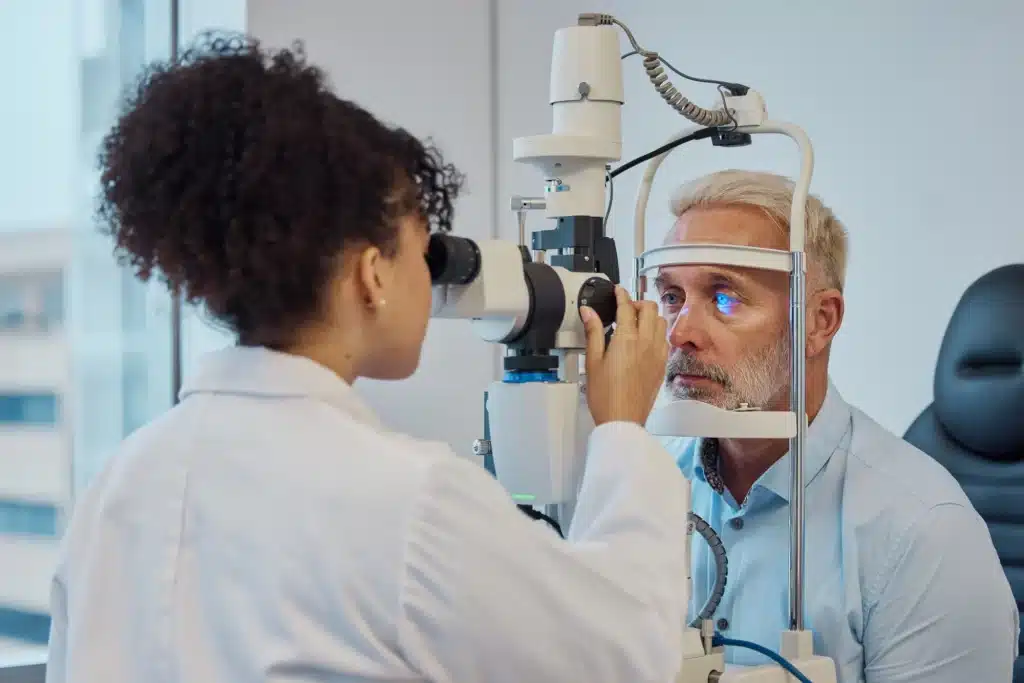Medically Reviewed by: Paul J. Stewart M.D.
National AMD and Low Vision Awareness Month
February is National Age-related macular degeneration (AMD) /Low Vision Awareness Month. Age-related macular degeneration is the leading cause of vision loss for individuals age 50 and older. Macular degeneration is a progressive, usually painless disease that affects the macula, the spot on the retina at the back of the eye responsible for central vision, causing central vision to blur, but leaving peripheral vision intact. In its earliest stages, AMD can be difficult to diagnose. In some cases, AMD progresses so slowly that many do not notice a change in their vision. In other cases, the deterioration is very rapid and can appear to happen overnight.
There are two major types of AMD, a “dry” and a “wet” form. The dry form is the early stage and is the most common form of AMD. There is usually little or no vision loss during this stage although there are exceptions with some people having significant vision loss from more advanced “dry” degeneration. The wet form is a late stage of the condition and affects about 10 percent of all people with the condition. Wet AMD accounts for the majority of central vision loss due to AMD.
The wet stage is when abnormal blood vessels start to grow beneath the center of the macula and, as they grow, they leak fluid or blood and cause central vision loss with blurring and distortion of vision. Untreated, these abnormal blood vessels typically will grow relatively large and eventually cause scarring with permanent and often severe central vision loss.
Signs & Symptoms of AMD (If you notice changes to your vision in the following areas you should speak with your doctor particularly if you are older than 50):
- You notice a blurred / blind spot in the center of your field of vision
- You require more light when reading
- You find it difficult to adapt to low lit areas
- Printed words become slightly blurry
- Colors do not seem as bright
- Sometimes you have difficulty recognizing faces
- Your overall vision is becoming hazy
Causes of Macular Degeneration
Even though there is no known exact cause for Macular Degeneration, its origins are considered multi-factorial and the following factors may place you at a higher risk:
- Family history of Macular Degeneration
- Low macular pigment density
- Smoking
- High cholesterol
- Farsightedness
- Poor Diet / Obesity
- Sun exposure
What is Low Vision?
People with low vision find everyday tasks difficult to do – even with the aid of regular glasses, contact lenses, medicine or surgery. Reading the mail, shopping, cooking, seeing the TV and writing can seem challenging.
Just one more reason to see your eye doctor regularly for early detection of AMD. To schedule an appointment, call our office at 713-797-1010 or schedule an appointment using our convenient online form
Related Articles
Financing Options Available
Apply today to find a financing option that meets your needs.
Our Locations
Houston/Bellaire
6565 W. Loop S., Suite 650Bellaire, TX 77401
Medical Office:
713-797-1010
Medical Fax:
713-357-7276
LASIK/Near Vision:
Office: 713-395-1515
Fax: 713-357-7278
Pasadena
4415 Crenshaw RoadPasadena, TX 77504
Medical Office:
281-977-8800
Medical Fax:
281-977-8877
Sugar Land
15200 S.W. Freeway, Suite 130Sugar Land, TX 77478
Medical Office:
281-277-1010
Medical Fax:
281-277-4504
Clear Lake
455 E. Medical Center Blvd., Suite 110Webster, TX 77598
Medical Office:
281-332-1397
Medical Fax:
281-282-9152
Katy
Greenhouse Medical Plaza2051 Greenhouse Road, Suite 110
Houston, TX 77084
Medical Office:
346-547-7070
Medical Fax:
281-214-2971
The Woodlands/Conroe
100 Medical Center Blvd., Suite 118Conroe, TX 77304
Medical Office:
936-647-1610
Medical Fax:
936-647-1620


